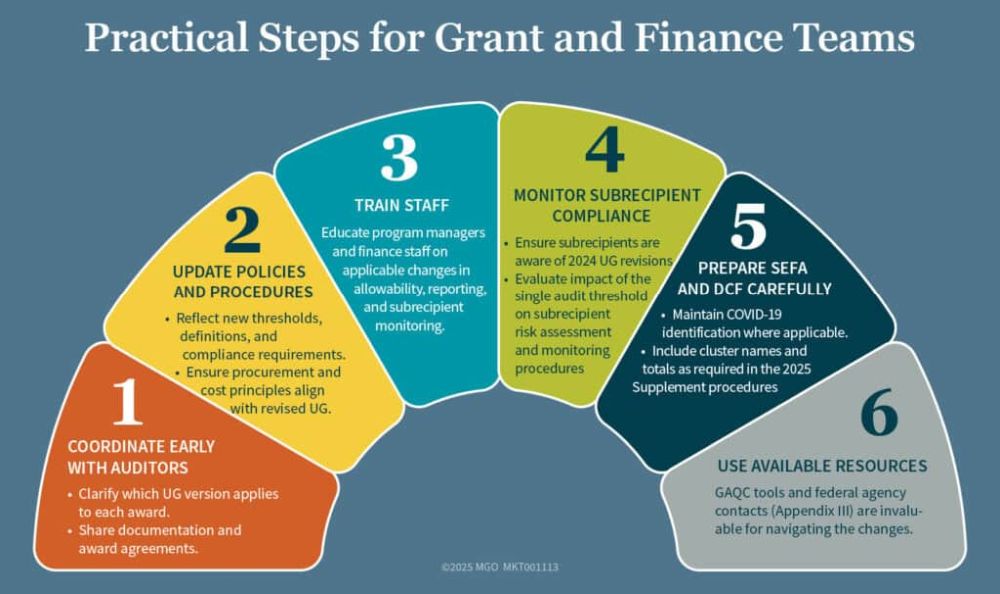- within Accounting and Audit topic(s)
- in United States
- with readers working within the Accounting & Consultancy, Banking & Credit and Healthcare industries
- within Government, Public Sector and Real Estate and Construction topic(s)
- with Finance and Tax Executives
Key Takeaways:
- The 2025 Compliance Supplement introduces new changes, including dual compliance frameworks and revised thresholds.
- Grant administrators and finance teams must prepare for evolving program requirements and heightened internal control expectations.
- Proactive planning and coordination with auditors are critical to achieving a successful single audit outcome.
As government organizations prepare for 2025 single audits, grant administrators and finance departments face a landscape shaped by significant regulatory updates, evolving program requirements, and heightened expectations for internal controls.
Each year, the U.S. Office of Management and Budget (OMB) releases a Compliance Supplement that outlines the rules and requirements for conducting a single audit. For audits covering fiscal years starting after June 30, 2024 (such as year-ends of June 30, 2025, and later), the 2025 Supplement will apply.
Although the 2025 Supplement hasn't been officially released, the OMB has shared a final draft to help auditors start planning. However, the American Institute of Certified Public Accountants (AICPA) Governmental Audit Quality Center (GAQC) has advised auditors to wait before issuing June 30, 2025 (or later) year-end single audit reports before the release of the final 2025 Supplement.
Even though the Supplement is still in draft form, understanding its anticipated changes is critical for effective audit planning and compliance.

5 Compliance Changes That Could Impact Your 2025 Single Audit
A key update in the 2025 Supplement is to implement the 2024 Uniform Guidance (UG) revisions. Appendix V of the Supplement provides a high-level summary of updates made across the various parts and appendices and includes a list of federal programs that have been added, deleted, or modified.
With the 2024 Uniform Guidance updates in mind, the following items highlight what's new and what actions you should consider:
1. Dual Compliance Framework: Parts 3.1 and 3.2
While the government-wide effective date is October 1, 2024, federal agencies may implement the 2024 UG revisions at different times. Some federal agencies may apply the changes earlier — starting June 21, 2024, for new awards or amendments — or delay implementation until October 1, 2025.
Accordingly, the 2025 Supplement introduces a bifurcated approach to compliance testing:
- Part 3.1 applies to awards governed by the pre-2024 UG.
- Part 3.2 applies to awards subject to the 2024 UG revisions, which federal agencies may implement at varying times.
Action Item:
Carefully review the terms of each federal award to determine which version of the UG applies and ensure compliance with the correct set of requirements. This will guide your audit preparation and internal control documentation.
2. Revised Thresholds and Definitions
The 2024 UG revisions increased several key thresholds:
- Equipment threshold: $10,000 (up from $5,000)
- Supplies threshold: $10,000
- Modified Total Direct Costs (MTDC) subaward threshold: $50,000
Definitions such as "participant," "prior approval," and "questioned costs" have also been clarified to promote consistency.
Action Item:
For federal awards subject to the 2024 UG revisions — update procurement, cost allocation, and other pertinent policies to reflect new thresholds and definitions.
3. Program Changes
As in prior years, the 2025 Supplement includes changes to various programs and clusters, including adding or removing federal programs from the Supplement. While these changes do not alter the underlying compliance requirements, they may affect how audit procedures are applied.
Action Item:
Coordinate with your auditors to confirm which programs are subject to audit and understand any new or revised audit procedures that may apply.
4. Internal Control Expectations
The 2025 Supplement reinforces the importance of internal controls in managing federal awards. Strong internal controls are essential not only for ensuring compliance but also for supporting a successful single audit outcome. The Supplement encourages the use of established frameworks such as the Committee of Sponsoring Organizations of the Treadway Commission (COSO) Internal Control-Integrated Framework and the U.S. Government Accountability Office (GAO) Green Book to guide the design and evaluation of these controls.
Grant administrators should ensure that internal controls are clearly documented for all direct and material compliance requirements. This includes describing how controls operate, who is responsible, and how they are monitored. Vague or incomplete descriptions — such as referring to a process without identifying a specific control — can lead to audit findings. Additionally, controls should be linked to identified risks to demonstrate how they mitigate potential noncompliance.
Understanding and maintaining effective internal controls is not just an audit requirement — it's a best practice for managing federal funds responsibly.
Action Item:
Conduct a control walkthrough and update documentation to align with the Supplement's expectations.
5. Risk Assessment and Major Program Determination
Until the final 2025 Supplement is officially released, the processes for risk assessment and major program determination (including definition of clusters) remain subject to change. This means the criteria used to identify major federal programs and assess audit risk may shift depending on final updates to the Supplement. Grant administrators should be aware auditors may adjust their approach once the final guidance is available.
Action Item:
Proactively discuss potential changes with your auditors to avoid delays or confusion. This will help foster a shared understanding of the audit timeline and any documentation that may be needed once the Supplement is finalized.
Stay Ahead of 2025 Compliance Changes
The 2025 Supplement brings meaningful changes that require proactive planning and collaboration. By understanding the updates and taking targeted action, grant administrators and finance teams can strengthen readiness for the single audit season and maintain compliance with federal requirements.
The content of this article is intended to provide a general guide to the subject matter. Specialist advice should be sought about your specific circumstances.
[View Source]

